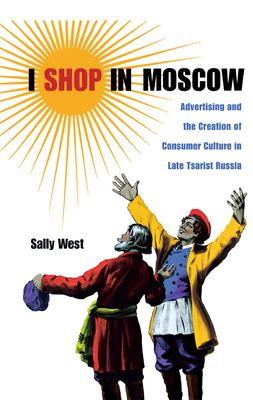This groundbreaking book is the first to study the cultural history of advertising in imperial Russia. In the first part of the book, West describes the development of advertising as an industry, discussing responses from both the business community and the state. The emergence of Russian advertising and consumer culture played a formative role in unsettling traditional tsarist society by promoting the aspirations of self-fulfillment through consumption. Encouraging a consumerist ethic at odds with an autocratic society, advertising spoke the language of both tradition and modernity, simultaneously perpetuating and undermining the values of the past. The rise of pervasive, mass-circulation advertising in tsarist society created paradoxes that reflect the tensions in late imperial Russia—a peasant society swiftly becoming a world industrial power, a modernizing economy within a patriarchal culture, and a population becoming consumers and citizens while still subjects of the tsar. West presents a cultural study of central themes that form the advertising messages themselves, including consumption as a progressive and civilizing force, the deliberate creation of "consumer" as a new identity, the perpetuation and reformulation of gender roles, and the appropriation and commodification of Russian cultural motifs. In an analysis of the advertisements themselves, West incorporates numerous illustrations from the mass-circulation press and the poster collection of the Russian National Library, many of which are difficult to access and unknown to most scholars. I Shop in Moscow offers an unexplored perspective for anyone interested in the comparative study of consumer culture and advertising. West's original study will appeal to scholars and students of advertising and Russian history, as well as those working in gender studies, folklore, and cultural history.
Get I Shop in Moscow by at the best price and quality guranteed only at Werezi Africa largest book ecommerce store. The book was published by Cornell University Press and it has pages. Enjoy Shopping Best Offers & Deals on books Online from Werezi - Receive at your doorstep - Fast Delivery - Secure mode of Payment
 Jacket, Women
Jacket, Women
 Woolend Jacket
Woolend Jacket
 Western denim
Western denim
 Mini Dresss
Mini Dresss
 Jacket, Women
Jacket, Women
 Woolend Jacket
Woolend Jacket
 Western denim
Western denim
 Mini Dresss
Mini Dresss
 Jacket, Women
Jacket, Women
 Woolend Jacket
Woolend Jacket
 Western denim
Western denim
 Mini Dresss
Mini Dresss
 Jacket, Women
Jacket, Women
 Woolend Jacket
Woolend Jacket
 Western denim
Western denim
 Mini Dresss
Mini Dresss
 Jacket, Women
Jacket, Women
 Woolend Jacket
Woolend Jacket
 Western denim
Western denim
 Mini Dresss
Mini Dresss






























































